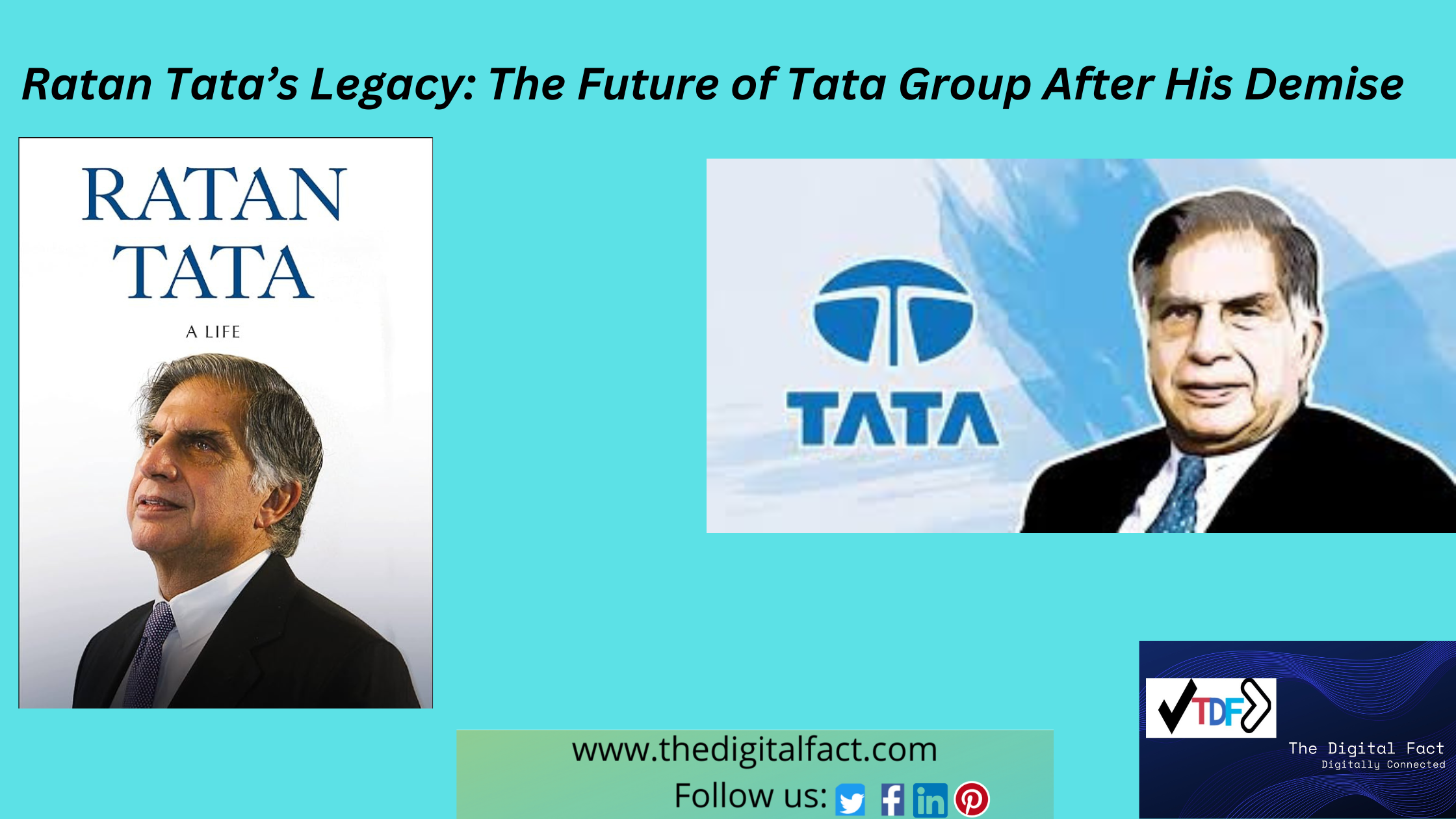Ratan Tata’s Legacy: The Future of Tata Group After His Demise :
Ratan Tata, a name synonymous with integrity, visionary leadership, and profound humility, has been at the helm of one of India’s largest conglomerates—the Tata Group. His contributions to the corporate world, as well as his commitment to social causes, have earned him a special place in the hearts of millions. While he is still with us, the discussion surrounding the future of the Tata Group after his demise is inevitable. This blog explores Ratan Tata’s enduring legacy and speculates on what lies ahead for the Tata Group in a world without its iconic leader.
A Brief Biography of Ratan Tata
Ratan Tata, born on December 28, 1937, in Mumbai, India, is a scion of the Tata family, one of India’s most respected and philanthropic industrial families. After earning his degree in architecture from Cornell University and completing the Advanced Management Program at Harvard Business School, he returned to India and joined the Tata Group in 1962.
Initially, Ratan Tata started his career on the shop floor at Tata Steel, where he worked alongside laborers, an experience that helped shape his management philosophy. Over time, he rose through the ranks and eventually succeeded J.R.D. Tata as the Chairman of Tata Sons in 1991. During his tenure, he transformed the Tata Group from a largely India-centric business into a global powerhouse.
Ratan Tata’s Legacy: Business Sales and Strategies :
Ratan Tata’s strategic acumen is one of the cornerstones of his legacy. Under his leadership, the Tata Group diversified its operations, moving into sectors such as IT, steel, automobiles, telecommunications, and more. His business sales and strategies played a pivotal role in driving the Group’s global expansion. Among the many highlights of his career, one of the most significant was the acquisition of global brands like Jaguar Land Rover and Tetley Tea, which established the Tata Group as a global player.
His visionary leadership also led to the birth of Tata Consultancy Services (TCS), now one of the world’s largest IT services companies. TCS has become a critical pillar of Tata’s global dominance, contributing significantly to the Group’s revenue and global standing. The success of TCS continues to bolster the reputation of Ratan Tata as a master strategist who always kept an eye on the future.
Furthermore, his focus on innovation can be seen in the development of the Tata Nano, aimed at providing affordable cars to millions of Indians. Although the Nano did not achieve commercial success, it remains a symbol of Tata’s commitment to social causes through innovative business models.
The Role of Philanthropy: Ratan Tata Trust :
Apart from his business acumen, Ratan Tata is equally celebrated for his contributions to philanthropy. The Ratan Tata Trust, established under his leadership, has played a significant role in improving the lives of millions in India. The trust works in various sectors, including healthcare, education, and rural development. It is estimated that 66% of Tata Sons’ profits are reinvested in the betterment of society, a testament to the Group’s commitment to corporate social responsibility (CSR).
Ratan Tata has always emphasized that a company must serve a purpose beyond profit. This principle is deeply embedded in the operations of the Tata Group and continues to inspire other business leaders globally. His commitment to social causes and ethical business practices sets him apart as a corporate leader who prioritized nation-building over personal wealth accumulation.
The Future of Tata Group After Ratan Tata’s Demise :
As Ratan Tata is no longer actively involved in the day-to-day operations of the Tata Group, the conglomerate’s future is often a topic of discussion. While he has laid a strong foundation, the next phase of Tata Group’s journey will depend on the leadership and strategic vision of its future leaders. Let’s explore what the future might hold for the Tata Group after Ratan Tata.
1. Leadership Transition :
The Tata Group is currently headed by N. Chandrasekaran, who took over as the Chairman of Tata Sons in 2017. His appointment marked a shift from the traditional family-run model, as he is the first non-family member to hold the position. Chandrasekaran, the former CEO of TCS, brings a wealth of experience in IT and business management, which positions him well to steer the conglomerate in an increasingly digital world.
Chandrasekaran’s tenure has been marked by efforts to streamline the Group’s operations, reduce debt, and focus on profitability. Under his leadership, the Tata Group has also ventured into new domains like electric vehicles and digital services, which are expected to play a key role in the Group’s future.
2. Business Diversification and Global Expansion :
The Tata Group has already established itself as a global powerhouse under Ratan Tata’s leadership, and this trend is likely to continue. With TCS leading the charge in the IT sector, the Group is expected to explore new avenues in technology, automation, and renewable energy. The expansion of Tata Motors into the electric vehicle space, with plans to become a major player in this sector, is another example of how the Group is preparing for the future.
Global expansion will remain a priority for the Tata Group. The acquisitions of iconic brands like Corus Steel, Jaguar Land Rover, and Tetley are proof of the Group’s ability to integrate and grow internationally. The focus on building a global brand that stands for excellence, quality, and ethical business practices will continue to guide the Group’s strategies moving forward.
3. Sustainability and Ethical Business Practices :
One of the core elements of Ratan Tata’s legacy is his emphasis on ethical business practices and sustainability. The Tata Group has long been a proponent of socially responsible business, and this is unlikely to change. With growing global awareness around climate change, sustainability, and corporate responsibility, the Tata Group is well-positioned to lead the charge in green technology and renewable energy.
The Group has already made strides in these areas, with investments in electric vehicles, clean energy projects, and sustainable infrastructure. As governments around the world tighten regulations on carbon emissions and environmental sustainability, Tata’s commitment to ethical business practices will serve as a competitive advantage.
4. Philanthropy: Continuing the Legacy of the Ratan Tata Trust :
Even after Ratan Tata’s demise, the Ratan Tata Trust will continue to play a pivotal role in shaping the Group’s identity. The focus on healthcare, education, and rural development will remain central to the Tata Group’s mission. The trust’s work in building schools, hospitals, and sustainable livelihoods for millions of people has been a hallmark of Ratan Tata’s leadership, and it is expected to carry forward his vision of nation-building.
The philanthropic arm of the Group ensures that the Tata brand remains closely associated with ethical responsibility, further enhancing its reputation globally. Future leaders of the Tata Group will have to ensure that they maintain this delicate balance between business growth and social responsibility.
Conclusion :
Ratan Tata’s legacy is monumental, and the impact he has had on the Tata Group and Indian industry is immeasurable. His visionary leadership, combined with a strong sense of ethical responsibility and philanthropy, has set the Tata Group on a path of sustained growth and global influence.
While his eventual demise will mark the end of an era, the systems, values, and strategies he has put in place ensure that the Tata Group will continue to thrive. With strong leadership in place, a focus on innovation and sustainability, and a commitment to ethical business practices, the Tata Group is well-equipped to face the challenges of the future while preserving the essence of Ratan Tata’s enduring legacy.
For more updates on SEO, Business, Technology, Trends, and much more Follow THE DIGITAL FACT.




